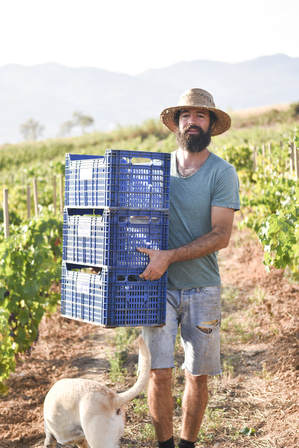
by Patrick Ogle
Ruben Parera is a farmer and a winemaker.
He is, in fact, a fourth generation farmer in Penedes, Spain, an area becoming known for its natural wines made from native grapes. Finca Parera is a fairly small producer, creating only around 1500 cases of wine a year. If you find bottles in the USA you can count yourself lucky. These are truly wines that reflect where the grapes grew up; the land is what you taste in your glass.
“The first step is always the vineyard and the agriculture with which you will work the plot." says Parera.
They are also a Biodynamic producer, following the rigorous set of rules that entails. Parera says the Biodynamic work and training with an individual tutor (one for each strain) is very important in the health of the grapes. Their wines use native yeasts and minimal sulpher. Finca Parera do not interfere in the development of the grapes with the use of chemicals but relying instead through positioning of the vines to garner optimum light.
"This way we could have a super healthy and balanced grape." he says.
They sort grapes by hand with skins and stems, use wild yeast and employ time in a clay pot for aging.
Why go to the extra effort to be a Biodynamic winemaker? It is an easy question for Parera.
"I am a Biodynamic winemaker because I am a Biodynamic farmer-- from this point of view, you cannot do one thing without the other. When you are Biodynamic in the field, you have to be in the cellar! Natural without fear,” he says. “Demeter certification is only a matter of market and sales because without certification we would be the same, doing the same thing."
Ruben Parera is a farmer and a winemaker.
He is, in fact, a fourth generation farmer in Penedes, Spain, an area becoming known for its natural wines made from native grapes. Finca Parera is a fairly small producer, creating only around 1500 cases of wine a year. If you find bottles in the USA you can count yourself lucky. These are truly wines that reflect where the grapes grew up; the land is what you taste in your glass.
“The first step is always the vineyard and the agriculture with which you will work the plot." says Parera.
They are also a Biodynamic producer, following the rigorous set of rules that entails. Parera says the Biodynamic work and training with an individual tutor (one for each strain) is very important in the health of the grapes. Their wines use native yeasts and minimal sulpher. Finca Parera do not interfere in the development of the grapes with the use of chemicals but relying instead through positioning of the vines to garner optimum light.
"This way we could have a super healthy and balanced grape." he says.
They sort grapes by hand with skins and stems, use wild yeast and employ time in a clay pot for aging.
Why go to the extra effort to be a Biodynamic winemaker? It is an easy question for Parera.
"I am a Biodynamic winemaker because I am a Biodynamic farmer-- from this point of view, you cannot do one thing without the other. When you are Biodynamic in the field, you have to be in the cellar! Natural without fear,” he says. “Demeter certification is only a matter of market and sales because without certification we would be the same, doing the same thing."
One of the many notable wines from Finca Parera is Khronos Penedes Sumoll. Sumoll is a Penedes grape; little is grown there (or anywhere else in the world). Most figures place Sumoll at less than 300 acres in production worldwide. It has a reputation as a grape that is difficult to grow and to make into wine. These considerations are secondary to Parera.
History is first.
"The Sumoll grape is indigenous in High Penedes. Many years ago this red grape, with Garnatxa, Carinyena and other locals grapes, were the most planted grapes here. This is the true history here and I have always thought that this variety would yield very fine, deep and well-aged wines." says Parera.
Khronos is a wonderful wine to drink young but it could certainly age. In describing it there is the temptation to compare it to more well known varietals but it is its own thing, its own unique wine with flavors and nuances unique to the grape and, more important, to Penedes.
"Sumoll has a good acidity and perfect tannins for aging in bottle or claytank or concrete tank. (It has) better variables for aging and good variables for fresh sensations in old wines." he says.
He says he has tasted this in other Sumolls including Els Jelipins from Gloria Garriga as an example of a fine version of the wine.
History is first.
"The Sumoll grape is indigenous in High Penedes. Many years ago this red grape, with Garnatxa, Carinyena and other locals grapes, were the most planted grapes here. This is the true history here and I have always thought that this variety would yield very fine, deep and well-aged wines." says Parera.
Khronos is a wonderful wine to drink young but it could certainly age. In describing it there is the temptation to compare it to more well known varietals but it is its own thing, its own unique wine with flavors and nuances unique to the grape and, more important, to Penedes.
"Sumoll has a good acidity and perfect tannins for aging in bottle or claytank or concrete tank. (It has) better variables for aging and good variables for fresh sensations in old wines." he says.
He says he has tasted this in other Sumolls including Els Jelipins from Gloria Garriga as an example of a fine version of the wine.
Parera is quick, and eloquent, in his dismissal of the notion of wine as art. To him it is more a trade, the result of hard work rather than inspiration.
"I do not think that it is art, but the ancestral trade of the farmer/winemaker (vigneron) that any person with sensitivity, training and practice could develop. I am the fourth generation of farmers and I love the land and respect the salut (health), time in cellar--is not an art, but a sensitive execution of an office." says Parera. "This I believe. For the art of sculpture, painting, dancing, etcetera you need a special natural gift since childhood, no? Something already predisposed to that artistic genius, right?"
It isn’t about art then but it is certainly about the terroir, the land.
Their land is more than vineyards. It includes organic cherry orchards, the first in Penedes as well as vegetables, almonds and olives. Finca Parera is in Upper Penedes, the part of the region furthest from the sea. The area sports a high altitude and calcareous-clay soil. Upper Penedes (or "High Penedes") also boasts large day to night temperature shifts which is generally a good thing for wine grapes; sunshine in the daytime and coolness to recover from heat at night.
Their vines range from young to nearly 80 years old. Finca Parera is agriculture focused and the land and its characteristics that make this possible.
"You can do things safely, but now we are focused on returning agricultural life to my daily life; we have many boxes of bees, a new orchard, replanted fruit of old varieties, we make marmalades and oils. (we want to) return to the farm a little!" he says.
"I do not think that it is art, but the ancestral trade of the farmer/winemaker (vigneron) that any person with sensitivity, training and practice could develop. I am the fourth generation of farmers and I love the land and respect the salut (health), time in cellar--is not an art, but a sensitive execution of an office." says Parera. "This I believe. For the art of sculpture, painting, dancing, etcetera you need a special natural gift since childhood, no? Something already predisposed to that artistic genius, right?"
It isn’t about art then but it is certainly about the terroir, the land.
Their land is more than vineyards. It includes organic cherry orchards, the first in Penedes as well as vegetables, almonds and olives. Finca Parera is in Upper Penedes, the part of the region furthest from the sea. The area sports a high altitude and calcareous-clay soil. Upper Penedes (or "High Penedes") also boasts large day to night temperature shifts which is generally a good thing for wine grapes; sunshine in the daytime and coolness to recover from heat at night.
Their vines range from young to nearly 80 years old. Finca Parera is agriculture focused and the land and its characteristics that make this possible.
"You can do things safely, but now we are focused on returning agricultural life to my daily life; we have many boxes of bees, a new orchard, replanted fruit of old varieties, we make marmalades and oils. (we want to) return to the farm a little!" he says.
Parera has also opened a bar, Salvatge, featuring natural wines in Barcelona. The bar is currently open and has wines in bulk.
Parera says he is interested in a number of other varietals native to Penedes from the white varietals: Picapoll, Carinyena Blanca, Sumoll Blanc, Sant Jaume, Escanyavelles and black types such as: Mandó, Rogenc, Garrut, Brocada.
They may or may not wind up producing wine from these.
"These grapes are 'ancestral' grapes, because today they are not planted in our country.For me it's investment in knowledge!” says Parera. “In the future maybe I make wine, maybe; today this is only for studying the vines and grapes in the vineyards."
Parera, himself, enjoys wines from Catalonia: Carriel dels Vilars, Recaredo, Joan Franquet, Carlania, Joan Asens, Clos Lentiscus and others, from Spain: Marenas, Daniel Ramos, Lagar do Merens and Puerta del Viento and from around the world: Foradori, Lewandowski, Chateau Laffitte and Mas del Perie.
The list of wines he enjoys is broad and is proof you need not focus in on one type of wine. Every wine you drink need not be Biodynamic nor, on the other hand, do they have to be ultra-traditional offerings. There are wines from all parts of the production spectrum for all tastes.
He says that people's expectation, anticipation about new wine is, in itself, reason enough to taste different wines. Adding that all wine lovers need to try new wines, from different unfamiliar grapes.
"Go ahead to taste the natural wines from the world!" says Parera.
Parera says he is interested in a number of other varietals native to Penedes from the white varietals: Picapoll, Carinyena Blanca, Sumoll Blanc, Sant Jaume, Escanyavelles and black types such as: Mandó, Rogenc, Garrut, Brocada.
They may or may not wind up producing wine from these.
"These grapes are 'ancestral' grapes, because today they are not planted in our country.For me it's investment in knowledge!” says Parera. “In the future maybe I make wine, maybe; today this is only for studying the vines and grapes in the vineyards."
Parera, himself, enjoys wines from Catalonia: Carriel dels Vilars, Recaredo, Joan Franquet, Carlania, Joan Asens, Clos Lentiscus and others, from Spain: Marenas, Daniel Ramos, Lagar do Merens and Puerta del Viento and from around the world: Foradori, Lewandowski, Chateau Laffitte and Mas del Perie.
The list of wines he enjoys is broad and is proof you need not focus in on one type of wine. Every wine you drink need not be Biodynamic nor, on the other hand, do they have to be ultra-traditional offerings. There are wines from all parts of the production spectrum for all tastes.
He says that people's expectation, anticipation about new wine is, in itself, reason enough to taste different wines. Adding that all wine lovers need to try new wines, from different unfamiliar grapes.
"Go ahead to taste the natural wines from the world!" says Parera.

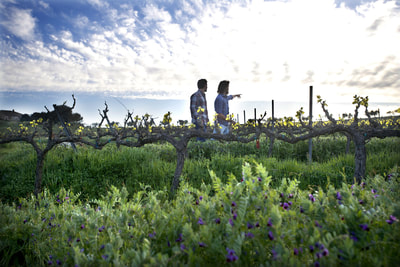
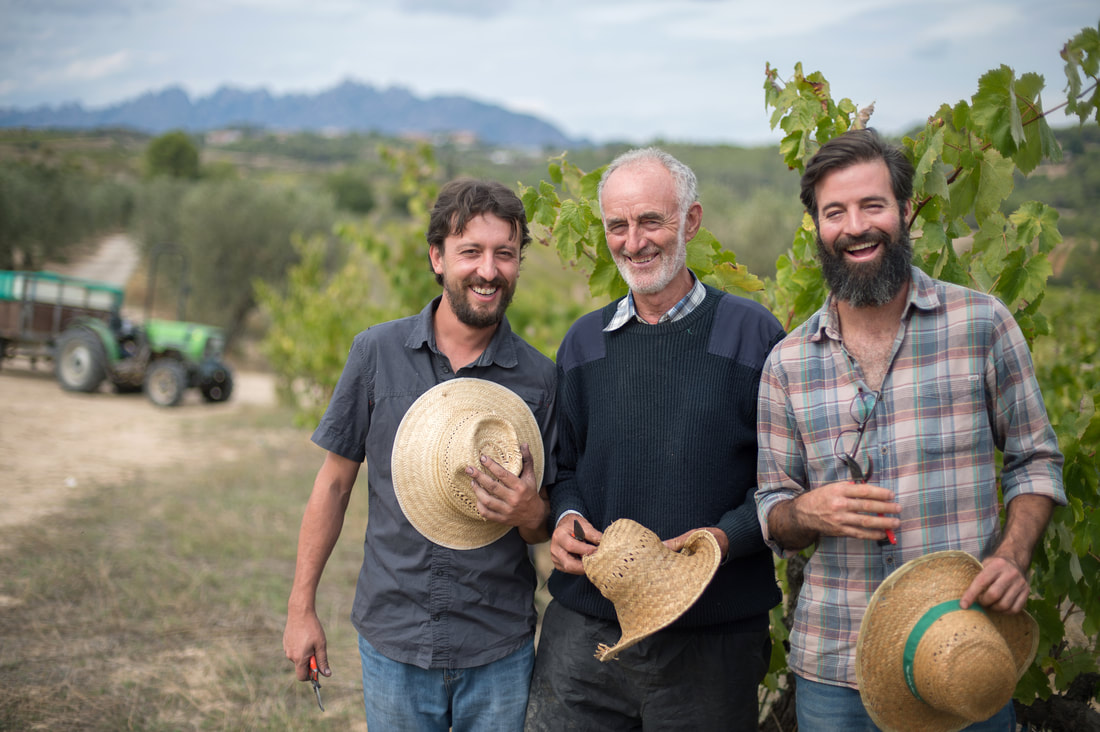
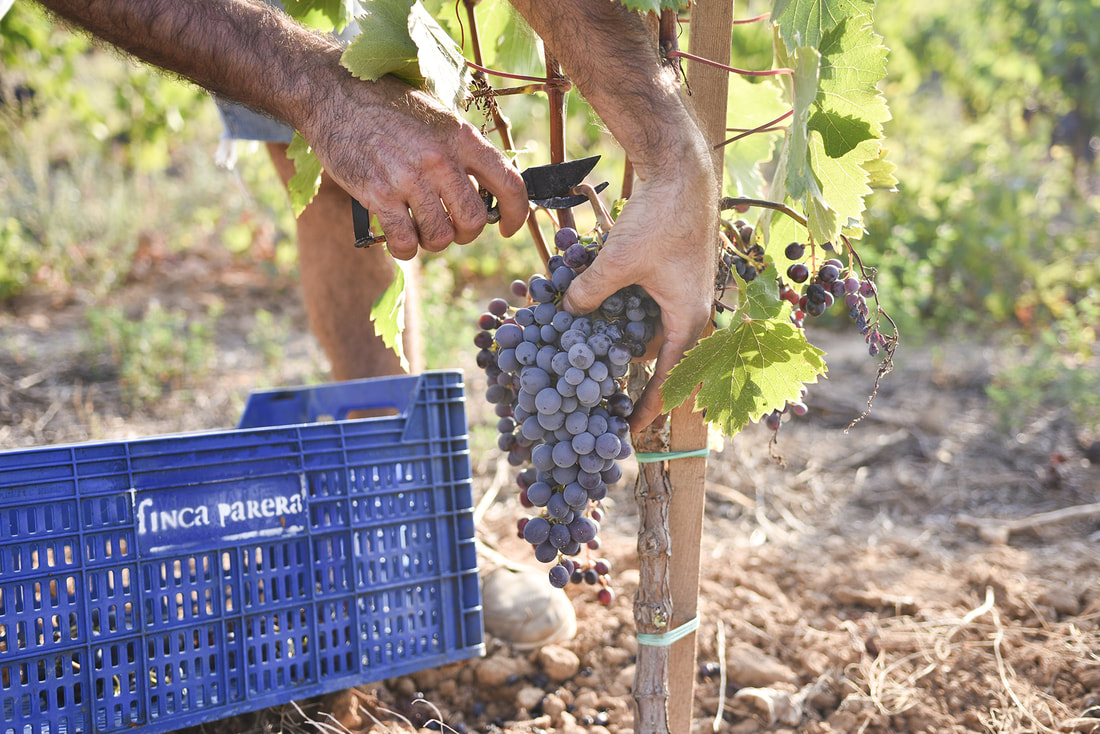
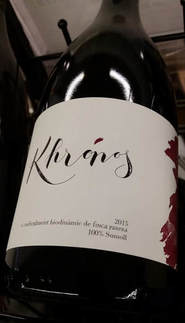
 RSS Feed
RSS Feed